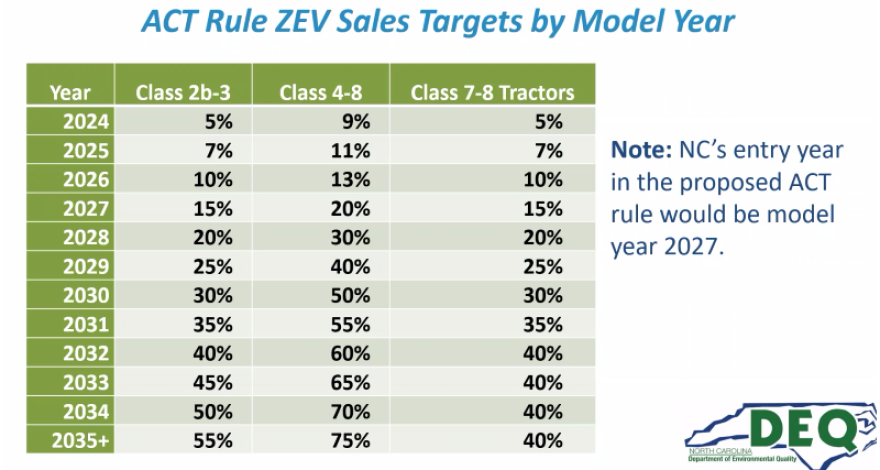North Carolina environmental officials are facing lots of questions as they push to adopt rules by year's end that would speed up sales of electric trucks and buses.
Gov. Roy Cooper wants the state to adopt what's known as Advanced Clean Trucks rules to help slow climate change. He made it a priority last October when he issued Executive Order 271. Transportation is the state's largest source of carbon emissions that cause global warming, so switching to electric trucks would help reduce those pollutants.

The proposed rules are the same as those in California. They would require vehicle manufacturers to sell an increasing number of electric trucks and buses starting in four years. Sales targets would apply to all vehicles over 6,000 pounds, from larger pickups and minivans to tractor-trailers and dump trucks. The rules would not apply to public transit buses, which are covered under other rules, but they would apply to school and private buses.
At an online meeting Tuesday, Department of Environmental Quality officials said they've heard a variety of concerns during meetings over the past two months. Business owners and fleet managers worry about costs, how the rules would affect rural areas and the availability of electric vehicle chargers.
"We can't just require the sales of these vehicles if we don't have the adequate charging infrastructure in place, which is perhaps an obvious point, but one that is very complicated and very important, something that we really need to focus on starting today," said Zach Pierce, a climate adviser to the governor.
Pierce said the state Department of Transportation is studying how to meet the need for more chargers and hoping for federal funding to help pay for them.
"A big theme that we heard from stakeholders was just broadly defined investment needs," Pierce said. "We know that this transition, while it offers all sorts of economic opportunities and savings opportunities, it's also going to require significant near-term investment."
In addition to federal money for charging infrastructure, there also could be incentives for truck buyers, he said.
Some participants in recent meetings have raised concerns that electric trucks would be too expensive. While they are currently more expensive than diesel ones, they're also cheaper to operate and maintain. And as with electric cars, there are incentives. Last year's federal Inflation Reduction Act offers tax credits of up to $40,000 for commercial vehicles, for both private companies and nonprofit or government fleets. Governments or nonprofits will get a direct payment since they are tax-exempt.
One question still unanswered is how the state might enforce the rules. On Tuesday, DEQ officials said they're considering using the existing "tiered enforcement" system used for other environmental violations. The system matches the severity of warnings and penalties with the degree of harm caused by violations, and penalties escalate with repeated violations.
The DEQ plans public hearings this fall and hopes the Environmental Management Commission will adopt the rules by Dec. 31. They would not take effect until the 2027 model year, to give truck makers time to prepare.
North Carolina would be the eighth state nationwide and the first in the Southeast to adopt ACT rules. Others are California, Oregon, Washington, New York, New Jersey, Massachusetts and Vermont.
SUPPORT LOCAL NEWS
From local government and regional climate change to student progress and racial equity, WFAE’s newsroom covers the stories that matter to you. Our nonprofit, independent journalism is essential to improving our communities. Your support today will ensure this journalism endures tomorrow. Thank you for making a contribution of any amount.





